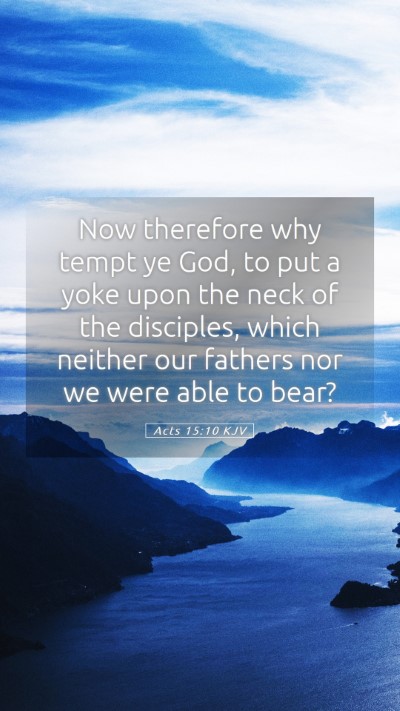Understanding Acts 15:10
Acts 15:10 states: "Now therefore why tempt ye God, to put a yoke upon the neck of the disciples, which neither our fathers nor we were able to bear?" This verse is part of a pivotal moment in the early church as the apostles gathered to address the question of whether Gentile converts should be required to follow Jewish law, particularly the practice of circumcision.
Bible Verse Commentary
This scripture encapsulates the profound theological shift occurring within the early Christian community, challenging long-standing Jewish traditions:
- Matthew Henry's Commentary: Henry emphasizes the danger of imposing laws that are beyond human capacity to obey. He argues that salvation is through grace alone, not adherence to the law.
- Albert Barnes' Notes: Barnes suggests that the burdensome yoke symbolizes the extensive regulations of the law which had caused spiritual strain on the Jewish people. He posits that placing this burden on Gentiles would be unjust.
- Adam Clarke's Commentary: Clarke notes that the term "tempt God" indicates a lack of faith in God's plan of salvation through Jesus Christ, implying that imposing the law would detract from the sufficiency of Christ's sacrifice.
Theological Insights
From the combined insights of these commentaries, several key theological concepts arise:
- Grace vs. Law: This passage highlights the debate between relying on divine grace versus the observance of Jewish law, questions that greatly shaped early Christian doctrine.
- Burden of the Law: The 'yoke' metaphor reflects the heavy burden of the Jewish law that even the Jewish people struggled to fulfill, thus showcasing the need for grace.
- Faith in Christ: The reliance upon Jesus for salvation as opposed to legalistic practices illustrates the heart of the Christian faith and the message of the Gospel.
Application of This Verse
Understanding Acts 15:10 allows modern readers to grasp important elements of biblical faith and practice:
- Freedom in Christ: Believers are encouraged to embrace the freedom provided through faith in Christ, rather than being weighed down by legalism.
- Community and Unity: The discourse in this chapter fosters a lesson on unity among diverse believers, emphasizing compassion over strict adherence to tradition.
- Importance of Grace: This passage serves as a reminder of the essential role of God’s grace in salvation, a theme that resonates throughout the New Testament.
Historical Context
This verse takes place during the Council of Jerusalem (Acts 15), a significant event for early Christianity. The apostles and elders gathered to discuss the inclusion of Gentiles, reflecting a major transitional phase from Jewish customs toward a more inclusive faith:
- The backdrop of this council includes debates fueled by the missionary journeys of Paul and Barnabas, who gathered Gentile converts.
- This moment in history reveals the early Church's struggle to define its identity, bridging Jewish tradition and the emerging Christian ethos.
- Acts 15 portrays the community's reliance on the Holy Spirit for guidance in decision-making, a principle central to Christian practice today.
Cross References
Acts 15:10 can be cross-referenced with several other scripture passages that address similar themes of grace and law:
- Matthew 11:30: "For my yoke is easy and my burden is light."
- Galatians 5:1: "Stand fast therefore in the liberty wherewith Christ hath made us free."
- Ephesians 2:8-9: "For by grace are ye saved through faith; and that not of yourselves: it is the gift of God."
Conclusion
Acts 15:10 serves as a vital scripture that encapsulates the transition from law to grace, urging believers to understand the importance of faith over legalistic adherence. The insights from public domain commentaries provide a rich tapestry of meaning essential for Bible study groups and individuals seeking deeper understanding of scripture. This analysis not only highlights the original context but also the timeless application of grace in the life of every believer.


